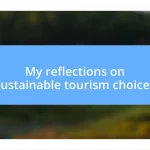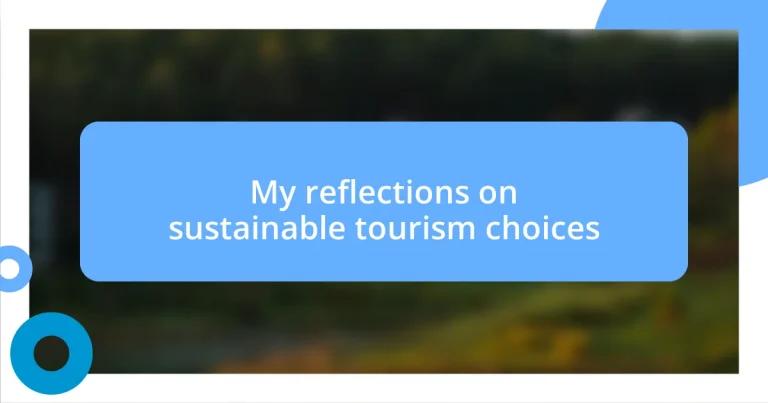Key takeaways:
- Sustainable tourism emphasizes making travel choices that minimize environmental impact and support local cultures, enhancing both personal experiences and conservation efforts.
- Traveling responsibly fosters meaningful connections with local communities, contributing to their economic support and preserving cultural heritage.
- Practical steps like using public transport, supporting local businesses, and choosing eco-friendly accommodations can significantly reduce one’s carbon footprint while enriching the travel experience.
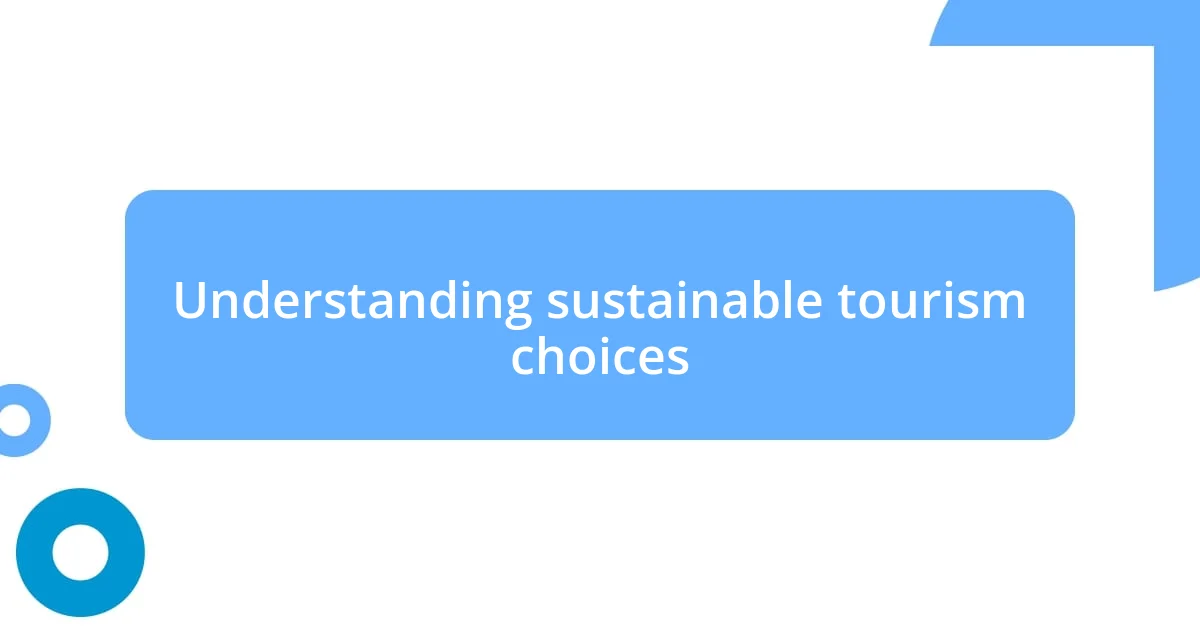
Understanding sustainable tourism choices
Sustainable tourism choices revolve around making travel decisions that minimize negative impacts on the environment and local cultures. I remember my trip to Costa Rica, where I opted for eco-lodges that were committed to preserving nature. Seeing how these small businesses thrived while respecting their surroundings made me realize the profound connection we can foster between travel and conservation.
When weighing sustainable options, it’s essential to consider how our choices affect local communities. Have you ever thought about how your travel spending influences the places you visit? I often reflect on my interactions with local artisans in markets. Supporting them not only enriches my travel experience but also helps preserve cultural heritage.
Education plays a significant role in nurturing sustainable tourism choices. It’s always enlightening to engage with local guides who share their stories and wisdom. On one hike in the Amazon, a guide explained the delicate balance between tourism and biodiversity. This insight reshaped my understanding of conservation. Isn’t it amazing how knowledge enhances our appreciation for the world we explore?
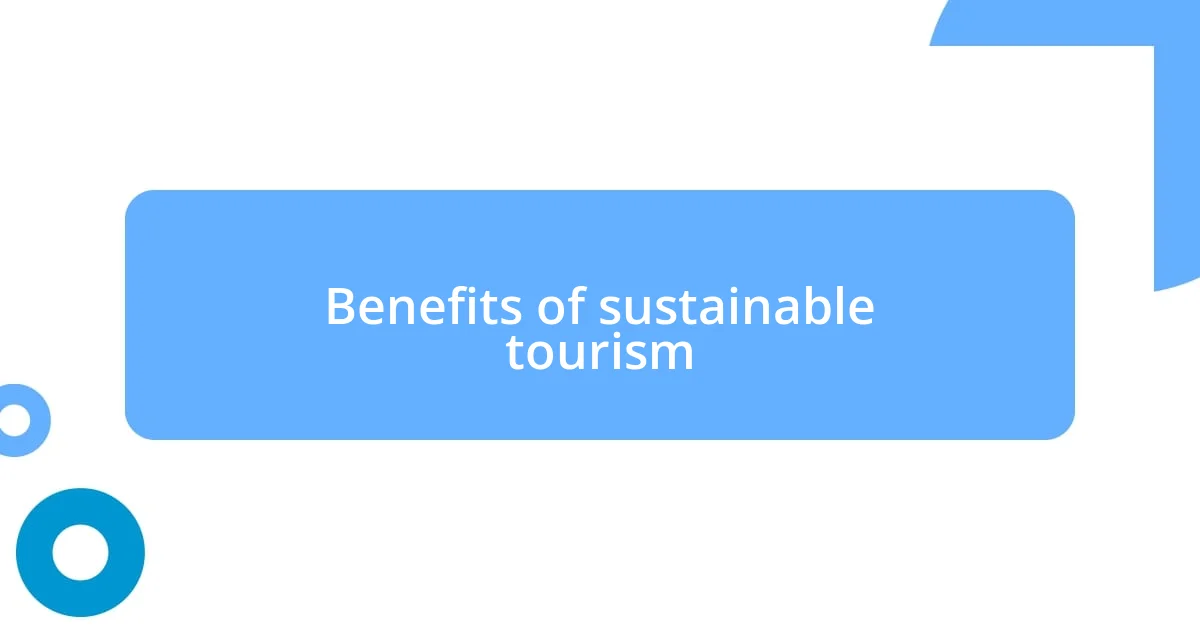
Benefits of sustainable tourism
Sustainable tourism offers numerous benefits that extend beyond just environmental conservation. For instance, I vividly recall volunteering at a marine reserve during a trip to Thailand. Not only did I learn about preserving coral reefs, but I also met like-minded travelers who became friends. This experience taught me that engaging in sustainable practices often leads to building meaningful connections, enhancing our overall travel experience.
Another rewarding aspect of sustainable tourism is the economic support it provides to local communities. I once stayed in a small guesthouse run by a family in a rural village. My presence there not only contributed directly to their livelihood but also allowed me to immerse myself in their daily lives. Witnessing the pride they took in sharing their culture made my journey more enriching and personal.
Lastly, sustainable tourism encourages travelers to be more responsible and mindful of their impact. While hiking in Patagonia, I noticed signs promoting Leave No Trace principles, emphasizing the importance of preserving nature for future generations. This reminder sparked a sense of accountability within me, inspiring a commitment to practice sustainability in all aspects of my life. Isn’t it incredible how travel can influence our values and behaviors?
| Benefit | Description |
|---|---|
| Meaningful Connections | Engaging in sustainable practices fosters friendships and community bonds. |
| Economic Support | Local businesses thrive when travelers choose sustainable options, aiding in economic growth. |
| Environmental Responsibility | Travelers are encouraged to be mindful of their impact, promoting long-term sustainability. |
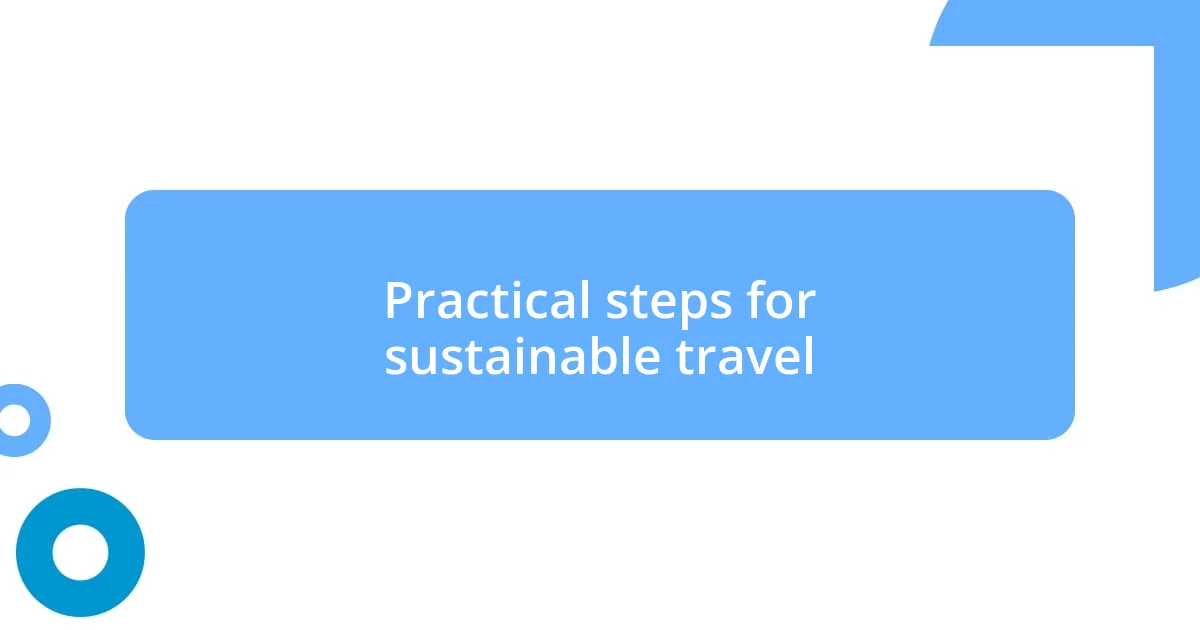
Practical steps for sustainable travel
One way to embrace sustainable travel is by making conscious choices about transportation. During my recent trip to Europe, I noticed how much more rewarding it felt to travel by train rather than flying. It wasn’t just about the reduced carbon footprint; the scenery was breathtaking, and I even made friends with fellow travelers. This experience highlighted how sometimes the journey can be just as memorable as the destination.
Here are some practical steps you can take to travel sustainably:
- Choose eco-friendly accommodations: Look for hotels or lodges that prioritize sustainability, such as those using renewable energy or supporting local communities.
- Use public transportation: Whenever possible, opt for buses, trains, or bicycles instead of renting cars. This not only lowers emissions but also allows you to experience the local culture more deeply.
- Pack light: By bringing only what you need, you reduce your carbon footprint and make your journey easier. Plus, it encourages you to shop local for any extras you might want!
- Support local businesses: Enjoy meals at locally-owned restaurants or buy souvenirs crafted by local artisans. I’ve found that these experiences often lead to unforgettable stories and connections.
- Participate in eco-tourism activities: Join tours or activities that promote conservation and respect for the environment, like wildlife sanctuaries or beach clean-ups. These opportunities can be both fulfilling and eye-opening, as I discovered during my visit to a community project in Bali, where I learned firsthand about the importance of coral restoration.

Choosing eco-friendly accommodations
Choosing eco-friendly accommodations can significantly enhance your travel experience while being kind to the planet. I recall a cozy eco-lodge in Costa Rica that not only had stunning views but also operated entirely on solar energy. It was heartwarming to see how they involved local artisans in their decor, creating a space that felt authentic and vibrant. Is there anything more delightful than enjoying a beautiful environment while supporting the community?
When searching for accommodations, I usually look for certifications, like those from Green Key or LEED. These certifications ensure that the place adheres to strict environmental standards. On one trip, I opted for a certified green hotel that even composted its waste. It felt good to know my stay was part of a broader commitment to sustainability.
Moreover, choosing eco-friendly accommodations often entails interacting with the community. I stayed at a charming eco-hostel in a bustling city, where the owner hosted nightly dinners featuring local cuisine. Sharing meals and stories with other travelers and locals made my journey unforgettable. Have you ever realized how such experiences can deepen your appreciation for a destination? I know I did!
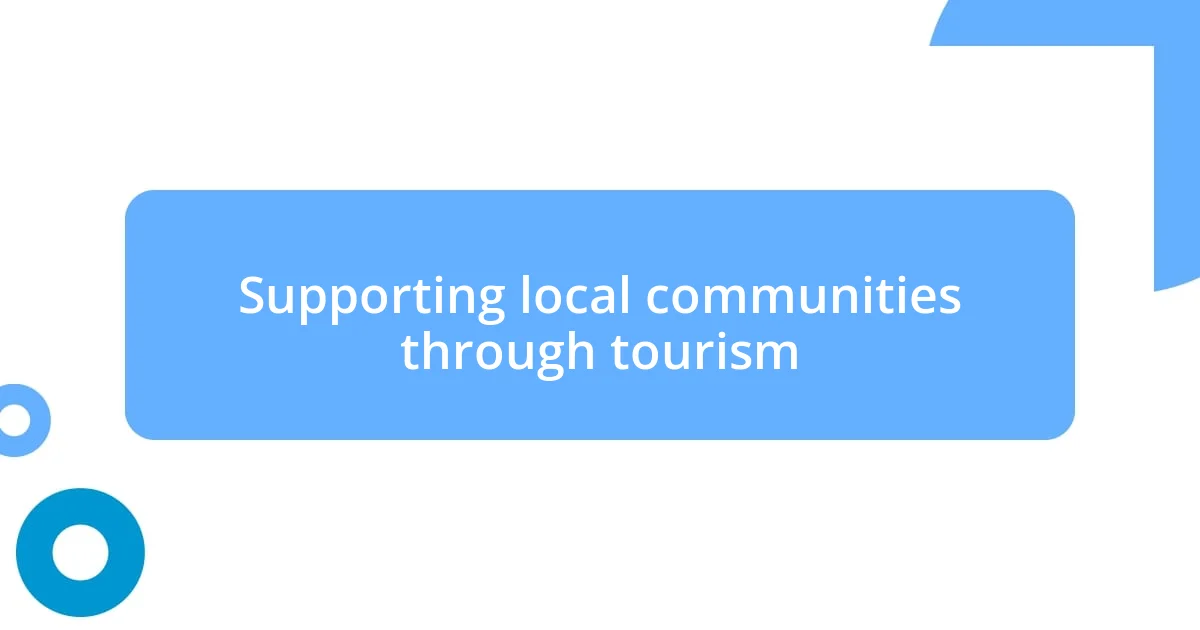
Supporting local communities through tourism
Supporting local communities through tourism creates a unique dynamic that benefits both travelers and residents. During my visit to a small village in Italy, I stayed with a local family who ran a bed and breakfast. It was amazing to see how my decision to stay there directly contributed to their livelihood. Sharing meals with them allowed me to not only savor authentic Italian cuisine but also hear stories about their traditions and struggles. Isn’t it rewarding to feel that personal connection while traveling?
When I bought handmade crafts from local artisans in that village, I learned about the time and effort they put into their work. It wasn’t just shopping; it was an opportunity to support their craft and preserve their culture. Each piece I purchased came with a story—a reminder of the beautiful people I met. Have you ever felt that sense of joy when your choices positively impact someone’s life? I certainly have, and it motivated me to seek out similar experiences on my travels.
Moreover, participating in local events, like a traditional festival, can immerse you in the community and help sustain their cultural practices. One day, I joined a lively harvest celebration where I was invited to partake in picking olives. This hands-on experience deepened my understanding of their way of life and bonded me with the locals. It made me realize that when you engage with a community, you help preserve its essence and contribute to its vitality. How can we opt for experiences that uplift others while enriching our journeys? It’s a question worth pondering, and the answer often lies in the choices we make as travelers.
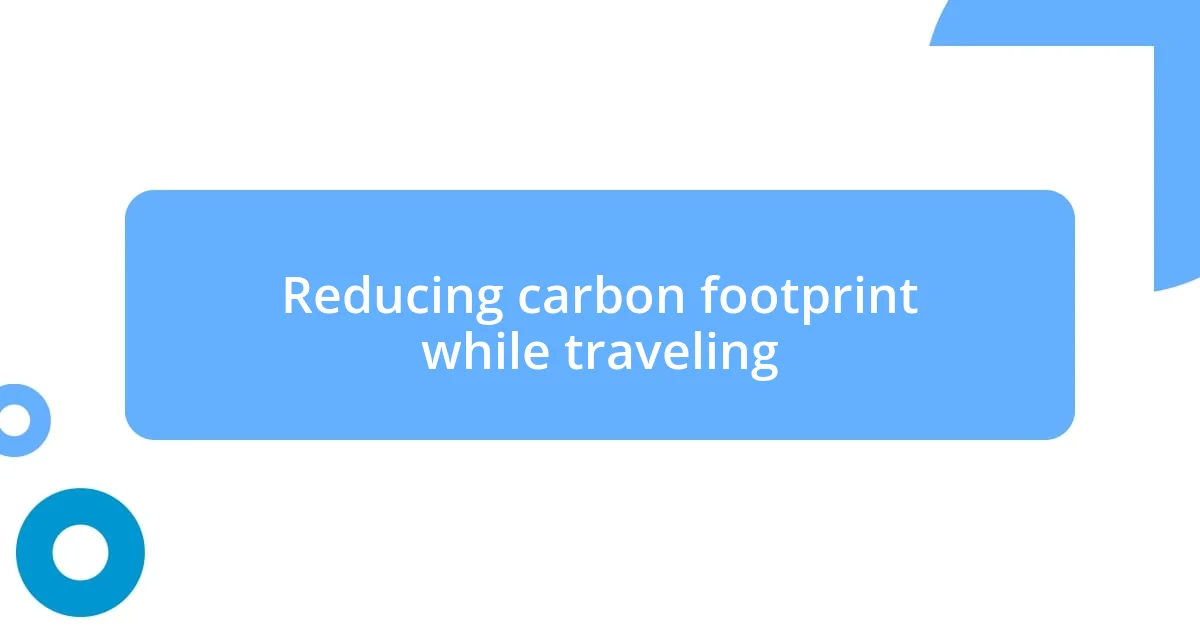
Reducing carbon footprint while traveling
Reducing carbon emissions while traveling is something I’ve been quite mindful of in recent years. One of my most memorable trips involved taking a train across Europe instead of flying. The breathtaking landscapes flashing by my window felt less like a means to an end and more like a part of the experience. Have you ever taken the time to enjoy the journey as much as the destination? It’s truly a game-changer.
Another way I try to minimize my carbon footprint is by opting for public transportation once I arrive at my destination. On a recent trip to Japan, I embraced the subways and buses, which not only made me feel like a local but also kept my environmental impact low. Navigating the bustling city of Tokyo without a car showed me how accessible and efficient public transport can be. Have you noticed how much more connected you feel when you’re amidst the rhythm of a city?
Additionally, I’ve started packing light to reduce the weight of my luggage, which in turn helps cut carbon emissions during travel. During a hiking trip in the Andes, I learned how much lighter my load felt, both physically and mentally. Traveling with less made me appreciate each item I brought, and it encouraged me to buy less during my journeys. It’s fascinating how a simple choice can lead to a more fulfilling experience. How have your packing choices affected your travels? I know for me, traveling light has made all the difference.





